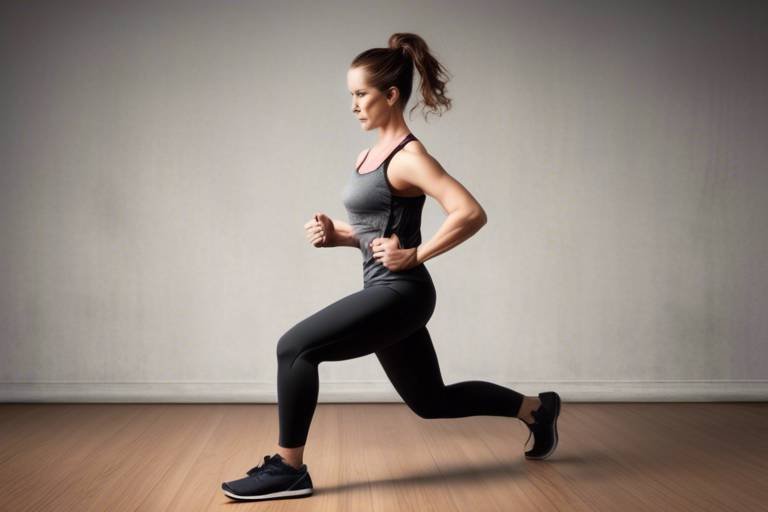Can Exercise Improve Confidence?
Have you ever noticed how a good workout can leave you feeling like a million bucks? It's not just your imagination; there's a solid link between exercise and self-confidence. When you engage in physical activity, you're not just sculpting your body; you're also sculpting your mind. It's like giving your brain a refreshing shower, washing away doubts and insecurities while boosting your mood. Exercise acts as a natural antidepressant, releasing those feel-good hormones known as endorphins. But how exactly does this all work? Let's dive deeper into the relationship between exercise and confidence.
Engaging in physical activity has profound psychological effects that extend well beyond the gym. When you exercise, you're not just burning calories; you're also reducing anxiety and improving your mood. Think of it this way: every time you break a sweat, you're giving your brain a little pep talk, reminding it that you can conquer challenges. This boost in mood can lead to enhanced cognitive function, which means you're not just feeling better—you’re thinking clearer too. Imagine tackling your day with a sharper mind and a brighter outlook. That's the power of exercise!
Let’s face it: our perception of our bodies can be a rollercoaster ride. Regular exercise can significantly impact how we view ourselves. It's crucial to understand that fitness isn’t just about aesthetics; it’s about feeling good in your own skin. When you engage in physical activity, you’re not only working towards a healthier body, but you're also cultivating a better relationship with yourself. This process can foster body positivity and enhance self-esteem, creating a solid foundation for confidence.
Exercise encourages self-acceptance and fosters a positive self-image. When you start seeing and feeling the physical changes from your workouts, it’s like flipping a switch in your mind. You begin to appreciate your body for what it can do, rather than how it looks. This shift in perspective reinforces your sense of worth. Just think about it: every time you push through a tough workout, you’re proving to yourself that you’re capable of more than you thought. That’s a confidence booster right there!
Establishing achievable fitness goals is another key element in enhancing self-confidence. When you set realistic targets, whether it’s running a certain distance or lifting a specific weight, you create a roadmap for success. Each time you reach a goal, no matter how small, you’re filling your confidence tank. It’s like planting seeds of accomplishment that grow into a beautiful garden of self-belief. As you achieve these milestones, you’ll find yourself more motivated to tackle even bigger challenges.
Recognizing and celebrating small achievements in fitness can significantly boost your morale and self-esteem. Did you finally complete that workout you dreaded? Or maybe you lifted a heavier weight than last week? These are victories worth celebrating! They reinforce a positive outlook on your abilities and potential. It’s like giving yourself a high-five every time you accomplish something. So, don’t shy away from acknowledging your progress; it’s a vital part of the journey!
Participating in group activities or fitness classes can also foster social connections, which enhance feelings of belonging and support. Picture this: you’re in a class, sweating it out with others who share your goals. You’re all in this together, cheering each other on. This camaraderie not only makes the experience more enjoyable, but it also contributes to improved confidence levels. When you feel supported by a community, it’s much easier to push through challenges and believe in yourself.
Identifying and addressing obstacles that prevent you from exercising can empower you to take charge of your fitness journey. Maybe it’s a busy schedule or a lack of motivation. Whatever it is, tackling these barriers head-on can lead to increased confidence and resilience. Remember, every small step you take towards overcoming these challenges is a victory in itself.
Effective time management can help you prioritize exercise, making it easier to incorporate physical activity into your daily routine. Think of your schedule as a puzzle; you just need to find the right pieces to fit in your workout. By carving out dedicated time for exercise, you’re not only enhancing your physical health but also your mental well-being.
Discovering enjoyable forms of exercise can make physical activity a rewarding experience. Whether it’s dancing, hiking, or playing a sport, finding joy in movement will lead to sustained engagement. When you enjoy what you’re doing, confidence naturally follows. It’s like finding your favorite song; the more you listen, the happier you feel!
- Can exercise really boost my self-esteem? Yes! Regular physical activity can lead to improved mood and self-image, significantly enhancing your self-esteem.
- What types of exercise are best for confidence? Any form of exercise that you enjoy can boost confidence. This could include strength training, yoga, dancing, or team sports.
- How long does it take to see improvements in confidence? The timeline varies for everyone, but many people notice changes in their self-esteem within a few weeks of regular exercise.

The Psychological Benefits of Exercise
Engaging in physical activity is more than just a way to stay fit; it’s a powerful tool for enhancing your mental health and boosting your self-confidence. When you exercise, your body releases endorphins, often referred to as the "feel-good" hormones. These little wonders act as natural painkillers and mood elevators, helping to reduce feelings of anxiety and depression. Imagine stepping into a gym or going for a run; as your heart rate increases, so does your mood. It’s like a switch flips inside you, illuminating your mental state and paving the way for a more positive outlook on life.
But the benefits don’t stop there. Regular physical activity can enhance cognitive function, making you sharper and more alert. When you’re more focused and clear-headed, you’re likely to tackle challenges with greater confidence. Think of it as sharpening a pencil; the more you exercise your mind and body, the more precise and effective you become in your daily life.
Moreover, exercise can significantly contribute to a sense of accomplishment. When you set out to achieve a fitness goal—be it running a certain distance, lifting a specific weight, or mastering a new yoga pose—you’re not just working on your physical body. You’re also building mental resilience. Each small victory in your fitness journey can lead to a greater sense of self-worth. It’s like stacking blocks; each achievement adds to your confidence, creating a sturdy tower that stands tall against self-doubt.
Let’s not forget the social aspect of exercise. Participating in group activities, whether it’s a spin class, a team sport, or even a hiking group, fosters connections with others. These social interactions can enhance your feelings of belonging and support, which are crucial for mental well-being. When you’re surrounded by like-minded individuals who cheer you on, it’s hard not to feel more confident in your abilities. You’re not just working out; you’re becoming part of a community that lifts you up.
In summary, the psychological benefits of exercise are vast and impactful. From reducing anxiety and improving mood to enhancing cognitive function and building social connections, engaging in physical activity can significantly boost your self-confidence. So, the next time you feel a dip in your self-esteem, remember that a good workout might just be the remedy you need. Why not lace up those sneakers and give it a try?

How Exercise Shapes Body Image
When it comes to understanding how exercise shapes body image, it's essential to realize that this relationship goes beyond just physical appearance. Regular physical activity can significantly alter the way individuals perceive themselves, fostering a sense of pride and accomplishment that radiates far beyond the mirror. Imagine looking at yourself and feeling a surge of confidence because you know you’ve put in the effort to improve your health and fitness. This shift in perspective can be transformative.
One of the most profound effects of exercise on body image is the enhancement of self-esteem. As you engage in physical activities, your body undergoes changes that you can see and feel. This can range from increased muscle tone to improved endurance. Each time you hit a new personal best, whether it’s lifting heavier weights or running a longer distance, you are not just achieving a fitness goal; you are also reinforcing a positive self-image. It’s like building a house—every workout is a brick that adds to the structure of your self-worth.
Moreover, exercise promotes self-acceptance. It encourages you to appreciate your body for what it can do rather than how it looks. This shift in focus can lead to a more positive relationship with your body. Instead of fixating on perceived flaws, you start to celebrate your body’s capabilities. For instance, consider how a runner feels crossing the finish line. That sense of achievement overshadows any negative thoughts about appearance, creating a more harmonious body image.
To further understand this connection, let’s consider some key factors that illustrate how exercise influences body image:
- Physical Changes: As you exercise regularly, your body becomes stronger and more toned, leading to increased satisfaction with your appearance.
- Endorphin Release: Physical activity triggers the release of endorphins, the body's natural mood lifters, which can improve your overall outlook on life.
- Community Support: Engaging in group exercises or classes can foster a sense of belonging, reinforcing positive feelings about yourself.
Understanding how fitness influences self-esteem is crucial for building confidence. It’s not just about losing weight or fitting into a certain size; it’s about feeling good in your own skin. When you embrace the journey of fitness, you begin to view your body as a vehicle for achieving your goals rather than a mere object to be critiqued. This perspective is liberating and can lead to a healthier, more fulfilling life.
In conclusion, the relationship between exercise and body image is complex but undeniably positive. When you engage in regular physical activity, you’re not just working on your physique; you’re also nurturing your mental health and self-acceptance. So, the next time you lace up your sneakers, remember that you are not just exercising your body; you are also empowering your mind and spirit.
- Does exercise really improve body image? Yes, regular exercise can enhance self-esteem and promote a more positive body image by fostering self-acceptance and physical changes.
- How long does it take to see improvements in body image from exercise? The timeline can vary for each individual, but many people start to notice positive changes in their perception of themselves within a few weeks of consistent exercise.
- Can exercise help with anxiety related to body image? Absolutely! Exercise is known to reduce anxiety and improve mood, which can help alleviate negative feelings about body image.

Building a Positive Self-Image
Building a positive self-image is like planting a garden; it takes time, patience, and the right conditions to flourish. When you engage in regular exercise, you begin to witness tangible changes in your body that can dramatically shift how you perceive yourself. It’s not just about shedding pounds or gaining muscle; it’s about the transformation of your mindset. As you start to see and feel these changes, your self-worth begins to blossom.
One of the most significant aspects of exercise is its ability to promote self-acceptance. This journey isn’t solely about aesthetics; it’s about embracing who you are and acknowledging your progress. When you push through a tough workout or achieve a personal best, you not only enhance your physical capabilities but also reinforce a sense of pride in your efforts. This is where the magic happens—your self-image starts to shift from critical to celebratory.
Moreover, exercise allows you to set and achieve realistic goals. These goals can be as simple as completing a 20-minute walk or mastering a new yoga pose. Each time you reach a milestone, no matter how small, you are sending a powerful message to yourself: “I can do this.” This continual cycle of setting goals and achieving them builds a robust foundation for a positive self-image. It’s a reminder that you are capable, resilient, and worthy of success.
To illustrate this concept, consider the following table that highlights how different types of exercise can contribute to building a positive self-image:
| Type of Exercise | Benefit to Self-Image |
|---|---|
| Cardio (Running, Cycling) | Boosts mood and reduces anxiety, leading to greater self-acceptance. |
| Strength Training | Increases physical strength and body confidence, reinforcing a sense of accomplishment. |
| Yoga | Fosters mindfulness and self-acceptance, enhancing body awareness and appreciation. |
| Group Classes | Builds community and support, creating a sense of belonging and shared goals. |
In addition to physical changes, the emotional benefits of exercise cannot be overstated. When you engage in activities that challenge you, you cultivate a sense of resilience. This resilience translates into other areas of your life, reinforcing the belief that you can overcome obstacles. Imagine facing a challenging workout; as you conquer it, you’re not just building muscle—you’re building mental fortitude and confidence in your ability to tackle life’s challenges.
Ultimately, the journey of building a positive self-image through exercise is deeply personal and unique to each individual. It’s about finding what resonates with you, whether that’s lifting weights, dancing, or simply going for a walk in nature. The key is to focus on the joy of movement and the empowerment that comes from taking care of your body. Remember, every step you take on this journey is a step towards a more confident and self-assured you.
- How long does it take to see changes in self-image from exercise? Changes in self-image can vary greatly among individuals, but with consistent effort, many people start to notice a difference within a few weeks.
- What if I don't see physical changes right away? Remember, the journey of self-improvement is not solely about physical appearance. Focus on how you feel and the mental benefits you're gaining.
- Can I build a positive self-image without exercising? While exercise is a powerful tool, positive self-image can also be cultivated through other means such as therapy, meditation, and self-reflection.

Setting Realistic Goals
When it comes to enhancing self-confidence through exercise, is absolutely crucial. Think of it like building a house: you wouldn’t start with the roof before laying the foundation, right? Similarly, establishing achievable fitness goals lays the groundwork for a successful and fulfilling exercise journey. These goals act as stepping stones, helping you progress at a pace that feels comfortable yet challenging enough to foster growth.
Realistic goals can vary from person to person, depending on individual fitness levels, interests, and lifestyles. The key is to ensure that these goals are specific, measurable, attainable, relevant, and time-bound (SMART). For instance, instead of saying, "I want to get fit," a more realistic goal would be, "I want to jog for 20 minutes, three times a week for the next month." This clarity not only provides direction but also makes it easier to track progress.
Moreover, setting smaller, incremental goals can lead to a series of mini-accomplishments that boost self-esteem. Imagine you’ve set a goal to increase your daily step count. Instead of jumping from 5,000 to 10,000 steps overnight, aim for a gradual increase. Perhaps start with 6,000 steps this week, then 7,000 the next. Each time you hit a new milestone, it’s like ringing a victory bell, reminding you of your capabilities and reinforcing your self-worth.
Additionally, it’s important to celebrate these small victories. Whether it’s treating yourself to a smoothie after a week of workouts or sharing your achievements with friends, acknowledging your progress can significantly enhance your motivation. This practice not only keeps you engaged but also cultivates a positive mindset, making you more likely to stick with your fitness routine.
In summary, setting realistic goals is not just about achieving physical results; it’s about fostering a sense of accomplishment and building confidence along the way. Remember, every step you take in your fitness journey is a step towards becoming a more confident version of yourself. So grab that pen, jot down your goals, and let the journey begin!
- How do I know if my fitness goals are realistic?
Start by assessing your current fitness level and lifestyle. Goals should challenge you but also be achievable within your circumstances. - What if I don’t meet my goals?
It’s okay! Use it as a learning experience to reassess and adjust your goals to better fit your needs. - How can I stay motivated to achieve my fitness goals?
Consider finding a workout buddy, tracking your progress, or rewarding yourself for milestones reached.

Celebrating Small Victories
Have you ever noticed how a small win can transform your entire day? When it comes to exercise, is not just a feel-good tactic; it’s a powerful motivator that can significantly boost your self-esteem and confidence. Every time you hit a milestone, no matter how minor it may seem, it’s like planting a seed of positivity in your mind. These moments of achievement can be as simple as completing an extra set of reps, running a little longer than before, or even just showing up for a workout when you didn’t feel like it. Each of these accomplishments deserves recognition!
Think of it this way: if you were climbing a mountain, would you ignore the beautiful views along the way? Absolutely not! You would stop, take a breath, and appreciate how far you’ve come. In the journey of fitness, these small victories are your scenic viewpoints. They remind you that progress is being made, even if it feels slow at times. When you celebrate these moments, you reinforce a positive mindset that encourages you to keep pushing forward.
So, how can you effectively celebrate these small victories? Here are a few ideas:
- Journal Your Progress: Keep a fitness journal where you note down each achievement, no matter how small. Looking back at your progress can be incredibly motivating.
- Share with Friends: Tell your friends or family about your accomplishments. Their encouragement can amplify your happiness and motivate you further.
- Reward Yourself: Treat yourself to something nice, like a new workout outfit or a relaxing massage, every time you reach a mini-goal.
By integrating these practices into your routine, you’re not just acknowledging your efforts; you’re reinforcing the belief that you are capable of achieving more. This sense of accomplishment can create a ripple effect, encouraging you to set and pursue even bigger goals. Remember, confidence is built on a foundation of success, and every small victory contributes to that foundation.
In essence, celebrating small victories in your fitness journey is about cultivating a mindset that values progress over perfection. It’s about realizing that every step forward, no matter how tiny, is a step in the right direction. So, the next time you find yourself accomplishing something in your workout, take a moment to bask in that success. You’ve earned it!
Q1: Why are small victories important in fitness?
A1: Celebrating small victories helps build confidence and reinforces a positive mindset, making it easier to stay motivated and committed to your fitness journey.
Q2: How can I track my small victories?
A2: You can keep a fitness journal, use fitness apps, or simply note down your achievements on a calendar to visualize your progress.
Q3: What are some examples of small victories?
A3: Small victories can include completing an extra set of an exercise, running a longer distance, or even consistently attending workouts for a week.
Q4: How can I celebrate my small victories?
A4: You can celebrate by treating yourself, sharing your achievements with friends, or simply taking a moment to acknowledge your progress.

Social Connections through Exercise
When you think about exercise, the first thing that might come to mind is the physical benefits—getting fitter, losing weight, or building muscle. But what if I told you that one of the most significant perks of exercising is the chance to forge meaningful social connections? Yes, it's true! Engaging in physical activities, especially in group settings, provides an excellent opportunity to meet new people and strengthen existing relationships. Whether it's a local running club, a yoga class, or a community sports team, the social aspect of exercise can be incredibly enriching.
Imagine walking into a gym or a park filled with individuals who share similar goals and interests. Suddenly, you're not just a lone exerciser; you’re part of a community. This sense of belonging can significantly enhance your overall experience. When you sweat it out with others, you create bonds that are often rooted in shared challenges and triumphs. It’s as if you’re all on the same journey, cheering each other on. And let’s be honest, who doesn’t love a little encouragement? Having a workout buddy or a group of friends to share your fitness journey with can make all the difference, especially on those days when motivation is running low.
Moreover, participating in group exercise can lead to improved mental well-being. The camaraderie you develop can help alleviate feelings of loneliness or isolation, which many people experience in today’s fast-paced world. Engaging in conversations before or after a workout can spark friendships that extend beyond the gym. You might find yourself grabbing coffee with a fellow gym-goer or planning a hike with someone you met in a fitness class. These connections can be incredibly fulfilling, providing both emotional support and accountability in your fitness journey.
Additionally, group activities often foster a spirit of healthy competition. When you're surrounded by others pushing themselves, it can inspire you to elevate your own performance. You might find yourself lifting heavier weights, running that extra mile, or trying a new exercise that you never thought possible. This collective energy not only enhances your workout but also builds your confidence. You begin to realize that you are capable of more than you initially believed, and that realization can be a game-changer.
In essence, the social connections formed through exercise are a vital component of the overall experience. They can lead to lasting friendships, provide a support system, and significantly boost your confidence. So, the next time you're contemplating hitting the gym or joining a class, remember that you’re not just investing in your physical health; you’re also opening the door to a world of social opportunities that can enhance your life in ways you never imagined.
- How can I find a workout group in my area? Look for local community centers, gyms, or online platforms like Meetup that cater to fitness enthusiasts.
- What if I'm shy about joining a group? Start by inviting a friend to join you, or try smaller classes to ease into the social aspect of exercise.
- Can exercising with others really improve my performance? Yes! The motivation and support from others can push you to achieve more than you might on your own.

Overcoming Barriers to Exercise
When it comes to exercising, many of us face barriers that can feel insurmountable. Whether it's a hectic schedule, lack of motivation, or even self-doubt, these obstacles can hinder our ability to engage in regular physical activity. The good news is that acknowledging these barriers is the first step toward overcoming them. By identifying what holds us back, we can develop strategies to break through these challenges and embrace a more active lifestyle.
One of the most common barriers is time management. With busy work schedules, family commitments, and social obligations, finding time to exercise can feel impossible. However, effective time management can transform your approach to fitness. Consider setting aside specific times during the week for exercise, treating these appointments as non-negotiable. For instance, early mornings or lunch breaks can be ideal for squeezing in a quick workout. The key is to prioritize your health and make a conscious effort to fit exercise into your daily routine.
Another significant barrier is the perception that exercise needs to be intense or time-consuming to be effective. This misconception can lead to feelings of overwhelm and frustration. In reality, even short bursts of activity can yield substantial benefits. For example, a brisk 10-minute walk can boost your mood and energy levels significantly. Incorporating physical activity into your day doesn’t have to be a chore; it can be as simple as taking the stairs instead of the elevator or doing a quick workout at home. Finding enjoyable activities that fit into your lifestyle can make exercise feel less like a burden and more like a rewarding experience.
Moreover, self-doubt can creep in, especially if you’re just starting your fitness journey. You might think, “I’m not fit enough” or “I’ll never be able to keep up.” It’s essential to challenge these negative thoughts and replace them with positive affirmations. Remember, everyone starts somewhere, and progress takes time. Setting realistic goals can help you stay motivated. Rather than aiming for perfection, focus on small, achievable milestones that celebrate your progress along the way. Each step forward, no matter how small, is a victory worth recognizing.
Social connections can also play a crucial role in overcoming barriers to exercise. Engaging in group activities or classes not only makes exercise more enjoyable but also fosters a sense of community and support. When you surround yourself with like-minded individuals, you’re more likely to stay committed and accountable. Consider joining a local sports club, fitness class, or even an online community. These connections can provide the encouragement you need to push through those tough days.
Lastly, let’s not forget about the importance of celebrating small victories. Recognizing and appreciating your achievements, no matter how minor, can significantly boost your self-esteem and motivation. Whether it’s completing a workout you didn’t think you could or simply showing up at the gym, take a moment to acknowledge your efforts. This practice not only reinforces a positive outlook on your abilities but also creates a cycle of motivation that propels you forward.
Q: What are some quick exercises I can do at home?
A: Bodyweight exercises like push-ups, squats, and lunges are great options. You can also try jumping jacks or planks for a quick workout.
Q: How can I stay motivated to exercise regularly?
A: Setting realistic goals, tracking your progress, and finding a workout buddy can help keep you motivated. Remember to celebrate your achievements, no matter how small!
Q: What if I don’t have time for a full workout?
A: Even short bouts of activity can be beneficial. Aim for 10-15 minutes of exercise throughout the day, such as taking a brisk walk or doing a quick home workout.

Time Management Strategies
Managing your time effectively is crucial when it comes to incorporating exercise into your daily routine. Many people feel overwhelmed by their busy schedules, often believing that they just don't have the time to fit in a workout. However, by implementing some smart , you can easily prioritize physical activity without sacrificing other important aspects of your life. Think of it like juggling; with the right techniques, you can keep all the balls in the air without dropping any!
One effective strategy is to schedule your workouts just like you would any important appointment. By blocking out specific times in your calendar, you create a commitment to yourself that makes it harder to skip a session. For example, if you know you have a busy week ahead, consider setting aside 30 minutes each morning before work or an hour on weekends to get your sweat on. This way, exercise becomes a non-negotiable part of your day.
Another tip is to break down your workouts into smaller, manageable chunks. If hitting the gym for an hour feels daunting, why not start with just 10 or 15 minutes? Research shows that even short bursts of activity can provide significant benefits. You might be surprised at how quickly those minutes add up! Plus, shorter workouts can be easier to fit into your schedule, allowing you to gradually build a consistent exercise habit.
Additionally, consider incorporating physical activity into your daily tasks. This could mean taking the stairs instead of the elevator, walking or cycling to work, or even doing some stretches during your lunch break. These little changes can make a big difference in your overall activity levels without requiring a complete overhaul of your schedule. It’s all about finding those opportunities to move throughout the day!
To help you visualize your time management strategies, here’s a simple table that outlines how to effectively allocate your time for workouts:
| Day | Time | Activity |
|---|---|---|
| Monday | 7:00 AM - 7:30 AM | Cardio (Jogging) |
| Wednesday | 6:00 PM - 7:00 PM | Strength Training (Gym) |
| Friday | 5:30 PM - 6:00 PM | Yoga Class |
| Saturday | 9:00 AM - 10:00 AM | Group Sports (Soccer) |
Finally, don't forget to evaluate and adjust your strategies regularly. Life is unpredictable, and what works for you one week may not work the next. Be flexible and willing to adapt your schedule as needed. After all, the goal is to create a sustainable routine that fits seamlessly into your lifestyle. Remember, it’s not about perfection; it’s about progress!
- How can I find time to exercise with a busy schedule?
Try scheduling workouts like appointments and breaking them into smaller sessions that fit into your day.
- What if I don’t have access to a gym?
Consider home workouts, outdoor activities, or even bodyweight exercises that require no equipment.
- How do I stay motivated to exercise regularly?
Set realistic goals, track your progress, and celebrate small victories to keep your motivation high!

Finding Enjoyable Activities
Finding enjoyable activities is like discovering hidden treasures; it can completely transform your relationship with exercise. Imagine waking up each morning, not dreading the thought of working out, but instead feeling excited about what the day holds. When you engage in activities that you genuinely enjoy, exercise stops being a chore and starts feeling like a rewarding adventure. Think about it: would you rather slog through a monotonous treadmill session or dance your heart out in a Zumba class? The choice is clear!
To kickstart this journey, consider exploring different types of physical activities. It’s essential to experiment with various forms of exercise until you find what resonates with you. Here are a few categories to consider:
- Aerobic Activities: Running, cycling, swimming, or even brisk walking can get your heart pumping and release those feel-good endorphins.
- Strength Training: Lifting weights or doing bodyweight exercises not only builds muscle but can also be incredibly empowering.
- Mind-Body Practices: Yoga and Pilates can enhance flexibility and strength while promoting mental well-being.
- Team Sports: Joining a local soccer or basketball team can foster a sense of community and teamwork.
Another fantastic way to find enjoyable activities is to think about your interests. Are you a nature lover? Then hiking or outdoor yoga might be your jam. If you love music, consider dance classes or even martial arts, where rhythm and movement come together. The key is to align your fitness pursuits with your passions. This not only makes the experience more enjoyable but also increases the likelihood that you’ll stick with it long-term.
Don’t forget about the social aspect of exercise! Working out with friends or joining a class can make the experience much more enjoyable. Imagine laughing and chatting while you engage in a fun fitness routine; it’s a great way to bond and keep each other motivated. Plus, being part of a community can provide a sense of accountability, making it easier to stay committed to your fitness goals.
Lastly, remember that variety is the spice of life! Mixing up your routine not only keeps things exciting but also challenges your body in new ways. Consider trying something new each week, whether it’s a different class at the gym, a new hiking trail, or even a sport you’ve never played before. This not only helps you discover what you love but also keeps your body guessing, which can lead to better results.
In conclusion, finding enjoyable activities is a crucial step in enhancing your confidence through exercise. When you love what you’re doing, it’s easier to stay committed, and the benefits will naturally follow. So, get out there, explore, and find your fitness passion!
Q1: How do I find an exercise I enjoy?
A1: Start by trying different activities, from team sports to solo workouts. Consider your interests and hobbies, and explore classes or groups in your area.
Q2: What if I don’t like traditional workouts?
A2: That’s perfectly fine! Look for alternative activities that get you moving, like dancing, hiking, or even playing games with friends.
Q3: How can I stay motivated to exercise?
A3: Set realistic goals, find a workout buddy, and celebrate your achievements, no matter how small. Keeping things fun and varied also helps maintain motivation.
Frequently Asked Questions
- Can exercise really boost my confidence?
Absolutely! Engaging in regular physical activity can lead to noticeable improvements in your mood and self-esteem. When you exercise, your body releases endorphins, which are natural mood lifters. Plus, as you achieve your fitness goals, no matter how small, you'll start to feel a sense of accomplishment that naturally boosts your confidence.
- How does exercise affect my body image?
Exercise plays a significant role in shaping how you perceive your body. Regular physical activity can lead to physical changes that enhance your appearance and promote a more positive self-image. When you feel good about your body, it directly influences your self-esteem and overall confidence.
- What are some realistic fitness goals I can set?
Setting realistic goals is crucial for maintaining motivation and building confidence. Start with small, achievable targets like walking for 20 minutes a day or completing a certain number of workout sessions each week. As you accomplish these goals, you’ll feel a sense of progress that fuels your confidence to tackle bigger challenges.
- How can I celebrate my small victories in fitness?
Celebrating small victories can be as simple as treating yourself to a favorite snack, sharing your achievements with friends, or even taking a moment to reflect on your progress. Recognizing these milestones helps reinforce a positive outlook on your abilities and encourages you to keep pushing forward.
- Can exercising with others help improve my confidence?
Yes! Participating in group activities or classes can create a sense of community and belonging. When you exercise with others, you share experiences and support one another, which can significantly enhance your feelings of confidence and motivation.
- What are some barriers to exercise I should be aware of?
Common barriers include lack of time, motivation, or access to facilities. Identifying these obstacles is the first step toward overcoming them. By addressing these issues, you can empower yourself to prioritize fitness and, in turn, boost your confidence.
- How can I manage my time better to include exercise?
Effective time management strategies can make a big difference. Consider scheduling your workouts just like any other important appointment. Setting aside specific times in your daily routine for exercise helps ensure you prioritize your health and well-being.
- What types of exercise are considered enjoyable?
Enjoyable activities vary from person to person, but think about what you love! Dancing, hiking, swimming, or even playing a sport can be fun ways to get moving. The key is to find something that excites you, making it easier to stick with it and build confidence over time.



















